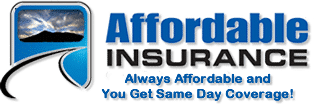Running vehicles for work in Aurora is part of daily life, whether we’re crossing I-225 to a jobsite, sending a van down Colfax for deliveries, or hopping on Peña Boulevard to the airport. We also know one fender-bender or hailstorm can throw off a whole week of jobs. That’s why Affordable Insurance focuses on affordable commercial auto insurance for Aurora businesses that actually fits how you operate here, not a one-size-fits-all policy from somewhere else.
Who Needs Commercial Auto Coverage In Aurora
If a vehicle touches your business in any real way, odds are you need commercial auto insurance. Personal policies are designed for commuting and personal errands. Work changes the risk.
Common Local Business Types On The Road
- Contractors and trades: plumbing, HVAC, electrical, roofing, painting
- Landscapers and snow removal crews
- Mobile services: locksmiths, mobile detailers, appliance repair, IT support
- Delivery services and couriers
- Food trucks and caterers
- Real estate agents and property managers
- Construction and materials suppliers
We see all of these in Aurora every day. For many, vehicles are rolling toolboxes. If yours is carrying gear, crew, or goods, your business needs to be listed on the policy.
When Personal Policies Fall Short
Personal auto insurance typically excludes business use beyond a simple commute. That means activities like transporting tools, delivering parts, taking paying passengers, or hauling equipment for a job often are not covered. If an accident happens on the way to a client meeting or a delivery, your personal insurer can deny the claim. Commercial auto coverage fills that gap and protects the business.
Hired And Non-Owned Auto For Employee Errands And Rentals
Even if you don’t own a company vehicle, you may still have exposure. Hired and Non-Owned Auto (HNOA) coverage provides liability protection when employees use their own cars for quick errands or when you rent a van for a weekend event. HNOA addresses third-party injuries and property damage. It does not pay for damage to the employee’s vehicle or the rental itself, so we help you pair it with the right physical damage options when needed.
We set up these coverages every week at Affordable Insurance, often with same-day proof.
Coverage Types That Matter
A good policy balances what the law requires with what your balance sheet needs. Here’s how we think about it when building affordable commercial auto insurance for Aurora businesses.
Liability: Bodily Injury And Property Damage
- Bodily injury liability pays for injuries you cause to others in a covered accident.
- Property damage liability pays for damage to other vehicles or property.
These are the core protections that also help satisfy contract requirements with general contractors, municipalities, or vendors.
Physical Damage: Collision And Comprehensive
- Collision covers damage to your vehicle from an at-fault crash or a hit-and-run.
- Comprehensive covers non-collision losses like theft, vandalism, fire, hail, and most weather events.
In Aurora, hail and sudden afternoon storms are a fact of life. If your trucks live outdoors, comprehensive is more than optional.
Uninsured/Underinsured Motorist And Medical Payments
Colorado roads still include drivers with little or no insurance. Uninsured/underinsured motorist (UM/UIM) helps protect your business when the at-fault driver can’t cover the loss. Medical payments can help pay medical costs for you or your passengers regardless of fault. Together, they add a layer of protection that goes beyond liability-only policies.
Endorsements: Cargo, Tools/Equipment, Rental Reimbursement, Roadside
Depending on your work, we may recommend:
- Cargo or goods-in-transit coverage for items you deliver
- Tools and equipment coverage for stolen or damaged gear
- Rental reimbursement to keep jobs moving while your vehicle is in the shop
- Roadside assistance for towing, jump starts, lockouts, and flats
We tailor these to your risk profile, vehicle type, and budget at Affordable Insurance.
Aurora-Specific Rules, Limits, And Proof Of Insurance
Colorado requires liability coverage of at least 25,000 per person, 50,000 per accident for bodily injury, and 15,000 for property damage. You must be able to show proof of insurance when asked by law enforcement or after an accident. If you have a serious violation history, the state may require an SR-22 filing. We handle those regularly for local drivers.
State Minimums Versus Recommended Commercial Limits
Minimum limits help you comply with the law, but they can be burned through by one multi-vehicle crash or a collision with a new SUV. Most businesses choose higher limits to protect assets and contracts. We’ll walk through real claim examples so you can choose limits that match your risk tolerance and cash flow.
Vehicle Classes, GVWR, And DOT Considerations
Coverage and pricing can change based on vehicle class and Gross Vehicle Weight Rating. Heavier trucks, stake beds, and units with permanent equipment can require different underwriting. If you run heavier vehicles or cross state lines, you may need DOT compliance, driver qualification files, and documented safety policies. We help you account for these details up front.
Certificates Of Insurance And Contract Requirements
General contractors, commercial landlords, and city contracts often require a certificate of insurance with specific limits and endorsements. We issue certificates quickly and keep them updated so your crew isn’t waiting in the parking lot for paperwork.
Ways To Lower Your Premiums Without Sacrificing Protection
Price matters, especially for small teams and growing fleets. We focus on practical steps that help reduce costs while keeping coverage where it counts.
Right-Sizing Vehicles And Coverage Limits
- Choose vehicles with the right GVWR and equipment for the job
- Avoid over-insuring older units that no longer justify full coverage
- Consider higher liability limits paired with sensible deductibles
Driver Screening, Training, And Safety Policies
Underwriters reward predictable risk. Simple steps make a real difference:
- Check MVRs before hiring and annually
- Set phone-free driving rules and seatbelt policies
- Require periodic ride-alongs for feedback
- Keep maintenance logs to reduce mechanical failures
Telematics, Dashcams, And Fleet Management Discounts
Telematics and forward-facing cameras can support driver coaching and defend your business after a claim. Many carriers offer discounts for enrolled units. Dashcam footage can turn a disputed intersection crash into a quick settlement that keeps your premiums stable.
Deductibles, Bundling, And Payment Strategies
- Choose deductibles that match your cash reserves
- Bundle commercial auto with general liability or property where it makes sense
- Pay-in-full or set up automatic payments to unlock discounts
At Affordable Insurance, we also work with carriers that accept low down payments so one month down can get you rolling. If you need a non-owner policy for a driver, or an SR-22 for a high-risk situation, we can place that too.
How To Compare Quotes And Choose A Provider
Comparing only the total price often leads to thin coverage or missing endorsements. We help you compare what matters.
Information To Gather Before You Shop
- VINs, year, make, and model for each vehicle
- Driver names, license numbers, and driving histories
- How and where the vehicles are used, average radius, garaging location
- List of tools or cargo typically carried
- Any contract-required limits or endorsements
Apples-To-Apples Comparisons: Limits, Deductibles, Endorsements
Line up each quote by liability limits, physical damage deductibles, UM/UIM, medical payments, and endorsements like HNOA, cargo, or tools. If one quote is cheaper, confirm it isn’t missing a key protection you actually need.
Local Claims Support, Repair Networks, And Turnaround Times
Ask about preferred repair shops near Aurora, parts availability, and average cycle times. We favor carriers with responsive adjusters, local networks, and fast certificate service. That combination reduces downtime, which is often the biggest hidden cost after a crash.
What To Do After An Accident In Aurora
Accidents rattle even seasoned drivers. A simple checklist helps keep everyone safe and protects your claim.
Immediate Steps At The Scene
- Check for injuries and call 911 if needed
- Move to a safe location if the vehicle is operable
- Exchange information and take photos of all vehicles, plates, and the scene
- Look for witnesses and gather contact details
Documenting Damages And Reporting Timelines
- Photograph damage, skid marks, traffic signals, and any cargo that shifted
- Write down the time, location, and weather conditions
- Report the claim as soon as possible to start repairs and rentals quickly
Working With Adjusters And Getting Back On The Road
Be honest and concise with the adjuster. Share dashcam or telematics data if you have it. Line up repairs with an approved shop to avoid delays. If you carry rental reimbursement, we’ll help you secure a temporary vehicle so your crew can keep appointments. Affordable Insurance stays involved alongside the carrier so you’re not chasing status updates while trying to run jobs.
Conclusion
Aurora businesses need coverage that keeps trucks on the road, meets Colorado requirements, and fits a real budget. That’s the heart of affordable commercial auto insurance for Aurora businesses, and it’s what we do every day. At Affordable Insurance, we specialize in helping contractors, couriers, food trucks, and local teams secure the right limits, add the endorsements that matter, and trim costs with smart safety practices.
If you’re ready for clear options, same-day coverage, and friendly local help, reach out to Affordable Insurance. Call us, stop by our Aurora office, or request a quote online. We’ll get you covered and back to work.
Frequently Asked Questions about Commercial Auto Insurance in Aurora
Who needs commercial auto insurance in Aurora?
If a vehicle supports your business—hauling tools, delivering goods, carrying crew, or visiting clients—you likely need commercial auto insurance. Personal policies usually exclude business use beyond commuting. For affordable commercial auto insurance for Aurora businesses, coverage is tailored to contractors, couriers, food trucks, property managers, and more to protect trips and cargo.
What does Hired and Non-Owned Auto (HNOA) insurance cover?
HNOA provides liability protection when employees use personal cars for errands or when you rent a van for work. It covers third-party injuries and property damage, not the employee’s car or the rental itself. Pair it with proper physical damage options. Many policies can issue same-day proof of coverage.
What insurance limits are required in Colorado, and what do Aurora businesses typically choose?
Colorado’s minimum auto liability is $25,000 per person, $50,000 per accident for bodily injury, and $15,000 for property damage. Many Aurora businesses select higher limits, plus UM/UIM and Medical Payments, to protect assets and meet contracts. You may also need SR‑22 filings or certificates of insurance depending on history and job requirements.
How can I lower premiums on affordable commercial auto insurance for Aurora businesses?
Right-size vehicles and coverage, avoid over-insuring older units, and set deductibles that match cash reserves. Screen drivers, enforce phone-free and seatbelt policies, keep maintenance logs, and consider telematics or dashcams for discounts. Bundle policies and choose pay-in-full or autopay. Local agencies can secure low down payments to get coverage started.
How much does commercial auto insurance cost in Aurora, and what drives the price?
Costs vary by vehicle class/GVWR, driver MVRs, radius, garaging, claims history, and coverage limits or endorsements. As a general reference, small Colorado businesses often see $120–$250 per vehicle monthly for liability-only, and $200–$500+ with comprehensive/collision or higher limits. Telematics, safe drivers, and smart deductibles can reduce premiums.
Do I need a USDOT number for my Aurora business truck?
You likely need a USDOT number if you operate a commercial motor vehicle (10,001+ lbs GVWR) in interstate commerce or transport placardable hazardous materials. Colorado also applies USDOT requirements to many intrastate carriers at similar weight thresholds. Heavier units may require driver qualification files and documented safety policies to stay compliant.

